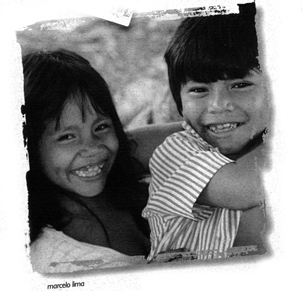Tikuna
kids /
Crianças
Tikuna
Aldeia
Filadelfia
Benjamin
Constant, Amazonas, Brasil
photo
(c)
Marcelo Lima
About
us /
Sobre
a Revista
Apoio
/ sponsors / partners
Presentation
/
Apresentação
Editorial
policy /
Normas
editoriais
Book
Reviews /
Resenhas
Review
Essays /
Ensaios
bibliográficos
Notas
de Leitura
Reading
Notes
Books
received /
Livros
recebidos
Web
Reviews / Links
general
index
table
of contents
indice
geral
Sign
our /
Assine
o nosso
Guest
Book /
Livro
de Visitas
Leia
o nosso /
Read
our
Livro
de Visitas /
Guest
Book
READER'S
FORUM
ESPAÇO
DO LEITOR
|
|
NOTAS
DE LEITURA / READING NOTES
Morss,
John - Growing Critical: Alternatives to Developmental Psychology
London
and New York: Routledge, 1996, 170 p.
This book is a survey of
Critical Psychology authors and authors from related areas, that have contributed
to the critique of Developmental Psychology as a scientific discipline
and as a specific social and ideological practice or group of practices.
"Human development is too important to be left to psychology", writes de
author in the preface. The issues related to Developmental Psychology
are presented from the perspective of, among others, marxist or rather
marxist related or marxist inspired, psychoanalytic, and social constructivist
authors.
The book may be useful as an introduction to the subject for those unfamiliar
with the authors discussed, and with the proposed alternatives
to Developmental Psychology. However, the author employs what
I call a "descriptive" approach, rather than a more sustained analytical,
explanatory or interpretative approach, in relation to the themes, the
various authors and ideas presented, due perhaps to a choice toward inclusion
of various "critical discourses", a choice of "extension" over "intension".
The result is rather a "description" of the different authors' critical
ideas on the problems with Developmental Psychology, namely: its
blindness to the social and political dimension of human realities,
the naturalization of human processes, of human relations and of
the scientific practice that underlies the development of the study of
human development itself. A subject, we may say, too important perhaps
to be treated in such an abbreviated, incomplete form. As one example we
can point out the following brief "definition" of the "anti-developmental"
approach that the author seems to favor: "(Carl) Ratner emphasizes
the wholly social nature of child and adult 'development'. In my
terms his account is anti-developmental because changes in activity
are explained without reference to underlying, natural regularities." (page
80). It maybe that the author, malgre-soi, constructs here a basic unity
of anti-developmental" perspectives ( be it a sort of "negative" unity)
even when he explicitly recognizes the differences in critical approaches
of the various critics he examines. Eclecticism appears to be in our time
a common risk in the task of identifying "counterhegemonic" currents.
And with it we see here also the risk of creating a "counter-narrative"
of sorts that may be not very far from the "Master-narratives" one opposes.
Marcelo G. Lima october
22. 2001
copyright
(c) 2001, 2002 Centro de Estudos e Pesquisas Armando de Oliveira
Souza CEPAOS
return
to CEPAOS Review Homepage
endereço
mailing
address:
Caixa
Postal 12833
São
Paulo, 04009-970,
Brasil
telefone
+ fax: (55) 11 - 50837182 Brasil
fax:
303-200-8866 USA
ww.cepaos.org
|

